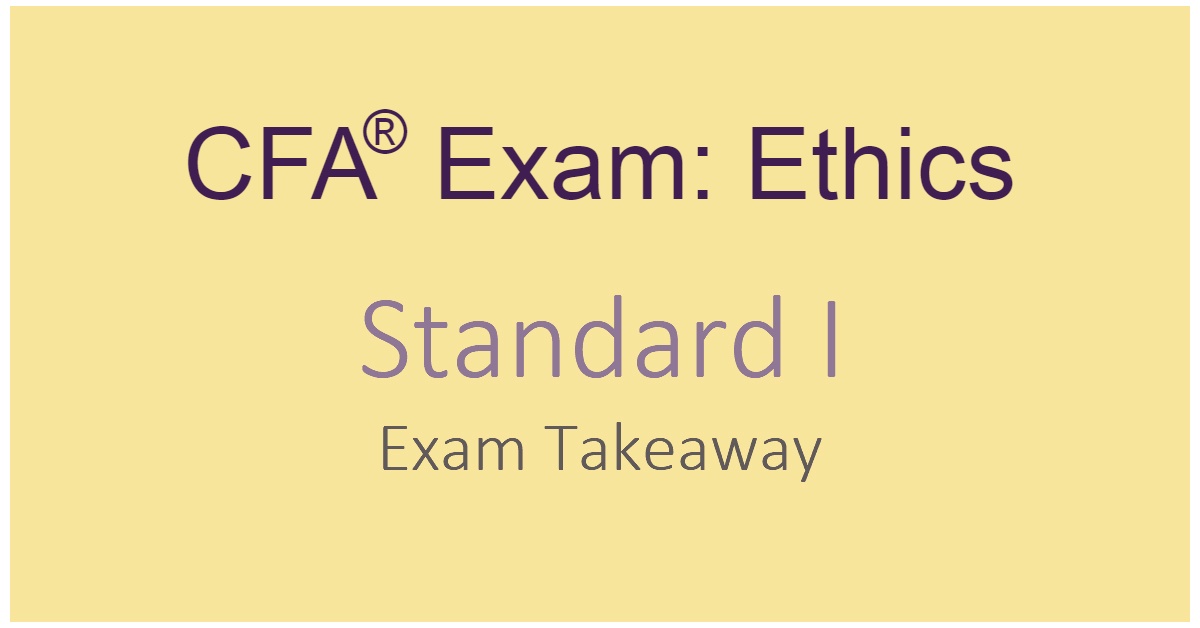CFA® Exam Ethics Summary: Standard I

Quick Ethics Review for CFA Candidates
Level 1 CFA Exam Ethics Summarized: Each ethical standard is devoted to a separate area of expertise. Standard I is about Professionalism. It has 5 sub-sections.
This blog post was created as a part of the CFA exam review series to help you in your level 1 exam revision, whether done regularly or shortly before your CFA exam.
Level 1 Ethics Cheat Sheet, Standard I
Here's a level 1 CFA exam cheat sheet for Ethics, Standard I on professionalism:
- (A) Knowledge of the Law,
- (B) Independence and Objectivity,
- (C) Misrepresentation,
- (D) Misconduct,
- (E) Competence.
CFA Exam, Standard I: PROFESSIONALISM
Standard I (A) – Knowledge of the Law
You must know what legal provisions apply to your profession and how they may affect your professional activities. Here are some simple rules you have to follow to obey the Standard I (A):
- become familiar with all relevant laws and regulations that may apply to the situation both in your own country and in the country you are trading with,
- always follow the strictest regulations of all,
- do not take part in any actions considered to be wrong by the Code and Standards even if under certain jurisdiction they are thought to be legal,
- communicate the violation fact to your supervisor to allow him to stop the unethical or illegal conduct and take further steps to prevent such situations from happening in the future,
- keep a record of the event and dissociate from it as soon as possible (it means you have to make it clear that you are not involved in or related to the illegal or unethical activity in any way),
- stay informed and keep track of any changes in the law that governs your professional activities.
You can learn more about CFA Institute Code of Ethics & Standards of Professional Conduct by visiting our CFA exam lesson on Ethics, Standard I .
Jonathan Smith, a CFA charterholder, works as a broker in America's Finest Finance Ltd. Lately, he’s been trading a lot for a client who comes from a small island in the Tonga archipelago. The client is a great patriot and often talks about his country in his conversations with Smith. When trading for the client, Smith should abide by:
- ...
- ...
- ...
This question is available for CFA exam candidates using our study planner to control their prep:
Already using Soleadea? 1. Sign into your account 2. Refresh this page to see the question.
Standard I (B) – Independence and Objectivity
Standard I (B) makes it clear that CFA members and candidates practicing the financial profession should strive to preserve their independence & objectivity. To ensure that your research, investment recommendations, or any other investment actions are free of bias, you should:
- not accept any gifts or any additional compensation for your work,
- distinguish between modest gifts and gifts that are not so modest anymore (you may consider accepting a modest gift, e.g. if it's from an individual client and it has no effect on other clients’ interests),
- report to your supervisor whenever you accept a gift or any kind of consideration,
- make disclosure before acceptance; if it’s not possible you should do it afterward as soon as you can (your disclosure will enable your employer to judge whether the gift might have biased your conduct and to what degree).
Standard I (C) – Misrepresentation
Standard I (C) indicates that CFA members and candidates must not knowingly make any false statements or omit any important information. It refers to any means or channels of communication, be it a written report, an oral presentation, or a phone conversation.
The general rule is that you:
- must not lie, deceive, or manipulate with what you say or otherwise communicate to your clients,
- must not plagiarise (always give the source whether it’s a quotation, graph, or table),
- must always give a proper reference whenever you use somebody else’s research for your work (e.g. secondary or third-party research),
- should always convey information to your client in the right way (e.g. do not guarantee any returns on volatile instruments).
Standard I (D) – Misconduct
Standard I (D) talks about reputation and professional competence and indicates their importance. In consequence, it bans any intentional misconduct, such as fraud, deceit, lies, stealing, and so on.
To make sure that investment professionals pay proper attention to their professional conduct, firms should enforce their ethical codes and compliance procedures. Employees should know what happens if the rules set in the company are violated.
Standard I (E) – Competence
Standard I (E) is strictly about developing competence as a financial professional, where competence is seen as a combination of knowledge, skills, and abilities that enable you to perform your professional responsibilities effectively.
Importantly, competence is specific to your role and responsibilities. To remain competent, you must continuously enhance your knowledge, sharpen your skills, and expand your abilities.
About Soleadea:
Our CFA Exam Study Planner is available to candidates of all levels at groundbreaking Pay-What-You-Can prices. You decide how much you want to pay for our services. After you activate your account, you get unlimited access to our Study Planner 4.0 with study lessons inside, various level 1/level 2 study materials & tools, regular review sessions, and a holistic growth approach to your preparation. Join

